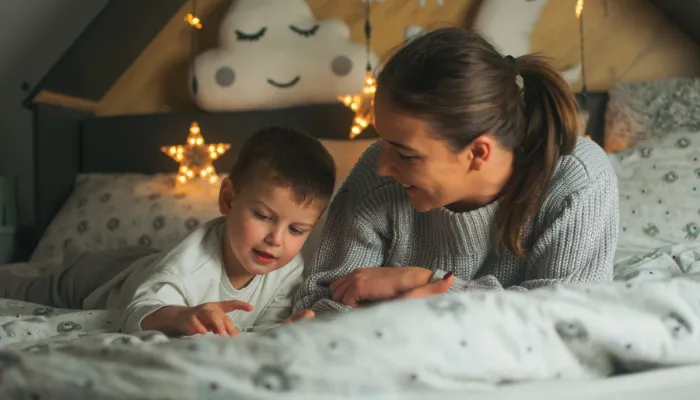Daylight Savings Guide For Parents

Daylight Savings Guide For Parents
You finally understand your kids’ sleep patterns and you’ve got a consistent bedtime routine down pat when suddenly… your clock falls back! (Or springs forward.) Daylight Savings time is here and your child's sleep schedule is officially out the window. But don’t worry… this new time change can be handled!
THE TIME CHANGE IS COMING! THE TIME CHANGE IS COMING!
If you have a hard time grasping the impact of changing our clocks twice a year on your family, pull up a seat. We're going to figure this out together.
(As we do twice a year every year 🫠)
A little calendar reality session (2024 edition)
- Thursday October 31st, Halloween
- Friday November 1st: Good luck to elementary school teachers everywhere
- Saturday November 2nd: Change your clocks before you go to bed
- Sunday November 3rd: Continually ask yourself "What time is it, and what time does it FEEL?!"
- Tuesday November 5th: Election Day (gulp)
Your mobile phones and other connected electronic devices will handle this change without you needing to do anything. But your analog watch, wall clock, microwave, and maybe your car will require you to set the time back by one hour.
Sure sure — sounds simple enough:
“Fall back.”
Or
“We gain an hour. Sunday morning will be fine!”
But I want to know the impact on families:
What will that actually FEEL like?
What will it mean for us as parents and for our kids?
Let’s just set aside my issue with the language around “Daylight Savings Time.” Daylight doesn’t get SAVED. It gets shifted. And in the fall we shift it BACK to Standard Time.
I won’t bother starting my petition to change the name to Daylight Shifted Time, because I recognize that's a "me problem," and at some point, maybe, we'll abolish this practice. But, government.
Let's talk numbers
When we change the clocks in the fall, 🌅 sunrise and 🌄 sunset will be 1 hour earlier.
That means the daylight hours are shifted to benefit the morning. Early mornings bring a light, brighter morning vibe.
But that also means evenings will get darker earlier. Less light in the evening, hibernation vibe.
Example for Bend, OR, 2024
Saturday November 4 >>> Sunrise 7:44 am >>> Sunset 5:52 pm >>> Daylight hours ~10
Sunday November 5 >>> Sunrise 6:45 am >>> Sunset 4:51 pm >>> Daylight hours ~10
The amount of daylight is a result of the angle of the earth’s axis in relation to the sun. Nice and smooth:
When the daylight occurs in the course of a day is a result of what time we collectively say it is. Hence, the hitches in March and November when we shift the clocks:
I want to get this out of the way up front: I’m not here to suggest slowly shifting your child’s bedtime over the course of the week for a gradual change. It sounds smart, I guess. And I BET you'd expect that of me. But truthfully, I don’t have it in me to do that for my own family, let alone suggest it for yours.
As always, say it with me: Know yourself, know your kids, know what to do. There is no best way to do things, but if you need some help… the rest of this blog post should help with that.
So let's suss out what this will actually look like and feel like in our families, starting with mornings

Q: What if you’ve been wanting to start a morning habit?
A: If you typically have a hard time getting up earlier, this can be a great time to jump start it. Waking up earlier might be easier, because your body clock will FEEL like it's an hour later.
Q: What if you wake up earlier than you’d prefer?
A: This is me. Sometimes I wake up at 4 am, rising to the surface of sleep with my thoughts strumming for the day. The November shift is bad news for the likes of me. I could be waking up at 3 am! It’s basically jetlag.
Q: What if it's hard to get your kid out of bed in the morning? (That's one of my kids)
A: The November shift can help, because, let's say their alarm goes off at 6:00 am, it will FEEL like 7 am, and they're getting an extra hour of sleep Saturday overnight into Sunday.
Q: What if your kid is an early riser and wakes up earlier than you'd prefer? (That was me as a kid, and karma and genetics granted me one of these kids.)
A: The November shift can make this problem worse, because, let's say their body has a wake-up time of 5 am. When their body says "Oh goody! It's 5 am! Time to get up!" The newly adjusted clock will say it's only 4 am! So, it’s a situation.
Now let's look at what all this means for the end of the day

Evenings will be darker earlier. On Sunday the sun will set here before 5 pm! Good grief.
On Saturday night, when you set your clocks BACK, oh look, you get to live this hour over again! You can get an extra hour of sleep if you go to bed at your usual time, you can stay up and watch another episode of whatever, my daughter can stay up and read for an extra hour (heaven). It’ll feel like you’re getting a later bedtime!
Q: What if your older kids typically like to stay up late, later than you think is good for them?
A: Bedtime could be easier on Sunday since their bodies will feel like it's later. So if they typically object to an 8 pm bedtime, on this day it will FEEL like 9, so they might give in to this earlier bedtime more easily.
Q: What if your young children typically fall fast asleep* at sleep time when their head hits the pillow?
A: Well, if their regular bedtime is 7:30, they’re body will FEEL like it’s 7:30 when the clock says it’s only 6:30! Get ready for the cycle of too-early-to-bed and too-early-to-rise.
A few sleep tips for parents
-- Purchase some blackout shades or blackout curtains to prevent the early morning light exposure from penetrating your room
-- Take a warm bath before bed to invoke some of those sleepy hormones
-- Limit your screen time / blue light time before bed
-- Stick with your usual bedtime routine if possible
-- Give yourself grace with your wake time
Listen. We’ve survived sleep disrupted by wet beds, sleep issues and regressions, jet lag, nightmares, growing pains, and time changes in the past. We’ll adjust to this one in a few days, too. Thanks for joining me down here in the Daylight Savings Time rabbit hole. Be sure to check back in when the end of daylight savings time rolls around!
XOXO
Erika
*Fun fact: “fast asleep” doesn’t mean “quickly asleep,” but rather, “sound asleep,” or “firmly asleep.” Same usage as in “hold fast!”
Mom-Win: Daylight Savings Guide For Parents

Set yourself a reminder for Saturday Nov 2 to change your clocks before you go to bed to prepare for the time shift.
Lower your standards for the week of Sunday November 3rd. Allow for nap time, and get the daylight when the gettin’s good!
This post was all about a daylight savings guide for parents. If this meant something to you, you might also like:
Your 4-Step Framework To Make School Mornings More Manageable
7 MORE Strategies for Easier, Calmer School Morning Routines
5 Ways To Start Taking In The Good
If this post helps make your mom-life easier,
subscribe to the weekly-ish newsletter and never miss a post.



